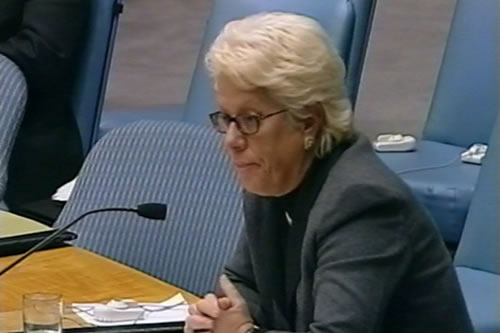Home
SERBIA-MONTENEGRO CHALLENGES UN SECURITY COUNCIL
Belgrade’s refusal to arrest and surrender the war crimes indictees, in Carla Del Ponte’s opinion, is not a challenge thrown to the Tribunal and its Office of the Prosecutor, but to the UN Security Council. It is now up to the Security Council to decide what to do.
 Carla Del Ponte in the Security Council
Carla Del Ponte in the Security Council The refusal of Serbia-Montenegro to arrest and surrender to the Tribunal the war crimes indictees is a “challenge to the Security Council”, it is stated in the written report submitted by Chief Prosecutor Carla Del Ponte to the highest UN body. It is now up to the Security Council, Del Ponte noted, “to decide what to do concerning the serious violations of international obligations under Chapter VII of the UN Charter on the part of a Member-State.”
Insufficient cooperation by states and entities of the former Yugoslavia, particularly of Serbia-Montenegro, according to the Prosecutor, “remains the single most important obstacle to be faced by the Tribunal in the implementation of the completion strategy.” There are 20 fugitives from international justice currently wanted by the Tribunal. In addition to the inevitable Karadzic, Mladic and Gotovina, Del Ponte mentioned by name four Serbian generals accused of the crimes in Kosovo: Djordjevic, Lukic, Lazarevic and Pavkovic; four Bosnian Serb military and police officers: Borovcanin, Nikolic, Pandurevic and Popovic, and a former high-ranking RS official, Zupljanin. Referring to two previous UN Security Council resolutions, Del Ponte noted that “objectives of the Tribunal […] will not be fulfilled before these accused are tried in The Hague.”
In Del Ponte’s opinion, Serbia-Montenegro remains a country “the most reluctant to cooperate”, where “the networks supporting persons accused of war crimes are so powerful and includes state structures.” Del Ponte added that they “successfully manipulate public opinion through aggressive smear campaigns against the Tribunal and its Prosecutor.”
A part of the political establishment “understands that it is necessary to cooperate fully with the Tribunal,” and has a positive attitude towards the demands to provide access to witnesses and documents, she said giving as example the president of the National Council for Cooperation, Rasim Ljajic. However, Del Ponte notes that she does not see any willingness on the part of the authorities in the Republic of Serbia to meet their international legal obligations. She adds that both Prime Minister Kostunica and his Justice Minister have made it clear that they do not intend to arrest any war crimes indictees. According to Del Ponte, this is not a challenge to her or to the Tribunal but to the Security Council which now must decide what – if anything – to do about it.
Linked Reports
- Case : Miscellaneous
- 2004-11-21 TRIBUNAL WILL NOT CHANGE ITS “JUDICIAL TEAM” UNTIL THE END OF ITS MANDATE
- 2004-11-03 DEL PONTE: THREE TRIBUNAL'S FUGITIVES IN RUSSIA!
- 2004-10-11 IMPUNITY BEARS THE GERM OF FUTURE CONFLICTS
- 2004-12-06 PROSPER: “GENERALS MUST GO TO THE HAGUE!”
- 2005-02-03 DEL PONTE URGES THE FUGITIVES TO “HURRY UP WITH THEIR SURRENDER”
- 2005-03-16 LAST ICTY INDICTMENT “NO CAUSE FOR CELEBRATION”
